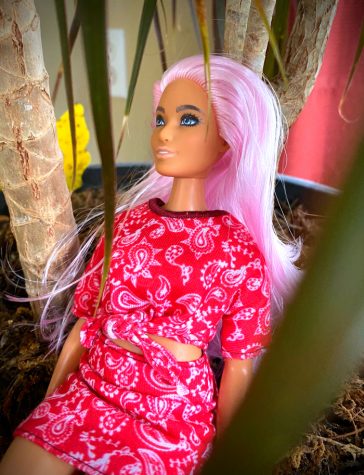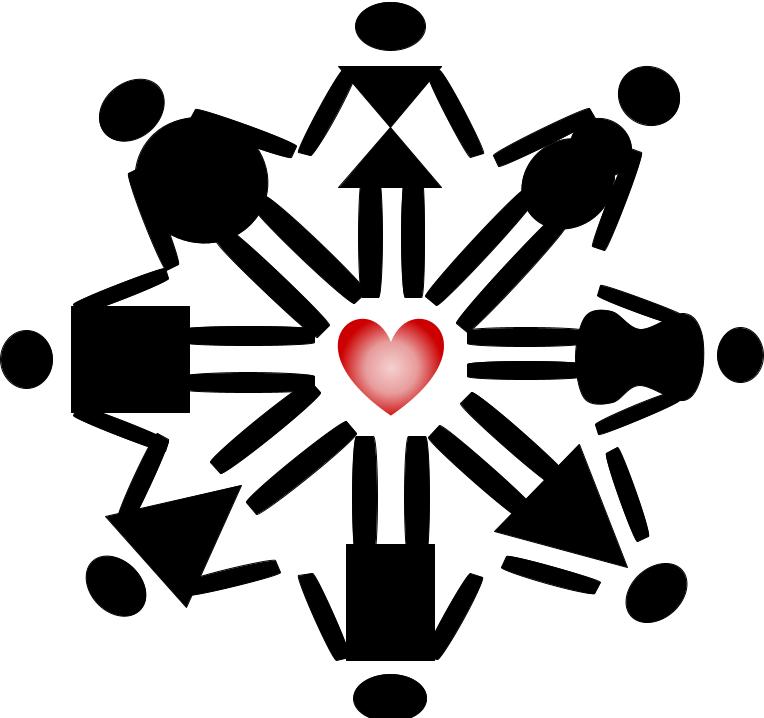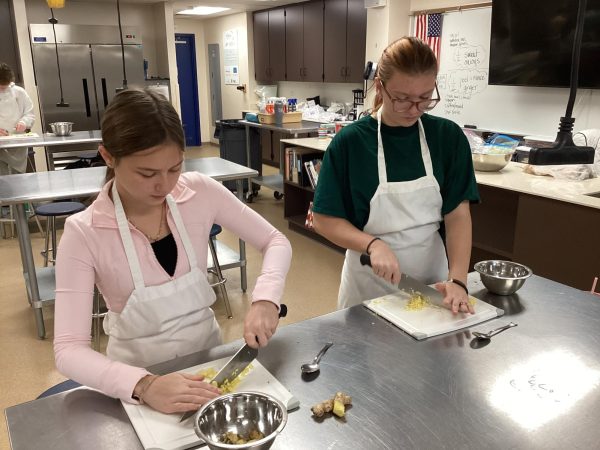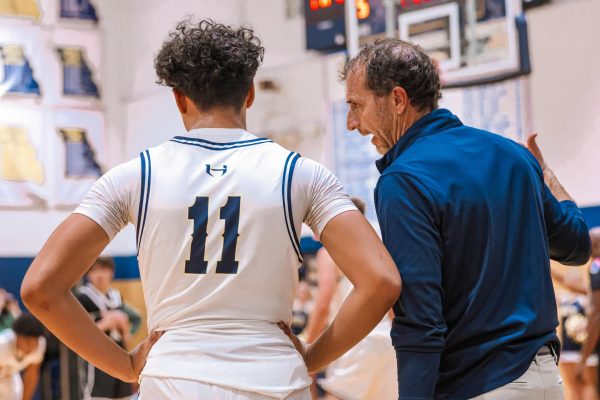Love Yourself
No matter your weight, height, skin color, or even your shoe size, you are beautiful.
For Spring Break, my family and I went on vacation. This was particularly special as we hadn’t ever gone on big vacation during Spring Break. My parents had decided to rent a cabin in Gatlinburg, Tennessee a year ago and because of COVID, we didn’t go. This year was different. The day after we arrived, we went to the store with a goal to fill the cabin with food and other necessities that we had found it to lack.

While my dad and I (we like to shop together) were walking down an aisle in Publix (similar to Dierbergs), I spotted her; a caramel skinned doll with long, shiny pink hair. But that wasn’t all that drew my attention to her. As I picked up the box, I realized she was body positive, her figure being more realistic than the typical Barbie. I thought her to be beautiful. She was a spark of diversity and it excited me that it was finally transitioning into being commonplace to find dolls of different sizes, races, ethnicities, and abilities (prosthetics and wheelchairs) in a store. With all this coursing through my head, I made the decision to add her to the cart.

But me getting a new doll at the store isn’t the point of this piece. Now, I may have immediately caught your attention with my usage of “body positive”, a term that has become prevalent in society. Body positivity, as defined by Wikipedia, is the “social movement initially created to empower individuals no matter their physical weight or size, while challenging the ways in which society presents and views the physical body”. However, body positivity takes on more personal definitions depending on the individual.
For Isabelle Kallbrier (‘24), body positivity means that you love and accept your body for the way it is. “You don’t let what people say about it bring you down. To me it also means that you bring other people up when they say negative things about their body and you tell them they’re beautiful and that they shouldn’t be ashamed of their body”.
To Dominic Humphress (‘24), it means not judging yourself based on what you look like but based on what you do.
Another interpretation is from Travis Wimberly (‘22). “[Body positivity is] being able to accept how one looks or enjoying the change you work towards to make yourself look how you want”.
Though each interpretation is unique, each still revolves around accepting and loving yourself for who you are as well as lifting others up who are struggling with doing so. Though this begs the question: why if we are wanting to accept ourselves do we have “ideal body types”? The students had many things to say.
Many chalk it up to it being “desirable” or “attractive”, while others dug a little deeper.
Michael Hammond (‘24) believes it to be because of media like magazines, movies, and commercials. Aurora Funston bounces off Hammond’s idea by bringing in famous people and influencers.
“[A lot of them] have the “perfect” body and look amazing so everyone thinks that is what they should look like for others to like them”. Funston (‘22) said. On the other hand, Brooklyn Johnston (‘24) believes it to be because we have an image stuck in our heads of what the perfect man and the perfect woman look like.
Another student, Vanessa Jennerjohn (‘24), ricochets off of Johnston’s idea with her own statement regarding societal standards and expectations.
“Society definitely has set high expectations when it comes to “ideal body types” for both men and women. Men are expected to be tall, thin, muscular, yet not too buff. Women are expected to have large breasts, large butts, flat stomach, and an hourglass figure. These expectations are incredibly hard to live up to and it makes so many people learn to hate their own bodies, which I find incredibly sad.” Jennerjohn said.
Elizabeth Patton (‘24) delves even further into the idea of societal impact on views of the body. “I think throughout time the ‘ideal’ body has changed a lot and I think society and social media have a huge impact on how people view themselves and their bodies,” Patton said. “I think this is because society needs something they can control and make money off of. They want to be able to photograph usually unhealthy men and women. Overall, I don’t really have a good answer or even idea for why society has an ¨ideal body type¨, but I do think that it gives people a very bad outlook on life and makes them think that you have to look a certain way to be happy or even to find a significant other. It gives people another thing that they have to stress about in an already stressful and hard world.”
With all of these ideas, it was time to ask the all important question: are you comfortable with yourself? This got some very interesting responses. Out of 17, nine said “yes” and six said “no”. Due to the individual nature of each response, they are shown below:
Elizabeth Patton (‘24): “Yes and no, personally I have struggled with feeling comfortable in my own body and have gone through body dysphoria and eating disorder(s). At times I would have answered this question with an automatic yes only due to the fact that I had lost a lot of weight and was no longer healthy and I thought that that was ‘beautiful’. I still struggle with looking into the mirror and being happy with what I see but I believe we were all made to be beautiful in our own way and beauty isn’t a one-way road, you don’t have to have a certain body type to be pretty/handsome just like how you don’t have to have long hair to be feminine or big muscles to ‘be a man’.”
Vanessa Jennerjohn (‘24): “I’m definitely not. I’ve always been insecure about my body and my weight. The world says I need a flat stomach, yet mine has some padding. The world says I need a big butt, but I’m left with a small one. The world says my breasts need to be big, when it really just doesn’t run in my genetics. I need an hourglass figure, so I’m ashamed when people see my rectangular shaped body. I preach with all my heart that every single size is beautiful, yet I can’t seem to apply that to my own body.”
Brooklyn Johnston (’24): “It took a long time to be comfortable in my own skin but I can confidently say that I am because I know the people who see the real me and the people who only look at me in disgust for not being perfect and skinny.”
Grace Muffler (’24): “Sometimes I am and sometimes I’m not, like I will dress confident but I’m so insecure but the reason I wear things like that is to inspire other girls to be confident and wear what you please because it’s your body.”
Michael Hammond (‘24): “[No], because everyone only cares about looks and not personality.”
Like those who answered “no”, those who answered “yes” all had their own reasons:
Dominic Humphress (‘24): “It helps me get ready for the next day.”
Aurora Funston (‘22): “I used to not be happy with my body but I’ve learned to love myself no matter what I look like and no matter what anyone else says. At times I still have some trouble and down times but at the end of the day I still love my body.”
Isabelle Kallbrier (‘24): “I mean I do sometimes, when I’m wearing certain clothing and depending on what mood I’m in, but most of the time I’m so insecure. I’ve been this way since 5th grade, but back then I didn’t know what ‘insecure’ meant, or if it was even a word. I most definitely didn’t know what body positivity was either. All the shame I put on myself about my body is because of one person that bullied me in 5th and 6th grade. He would call me fat and he’d say “Why do you walk so loud?”. He called me an ugly pig, and no one said anything about it either, they just let it happen. I see all of my “skinny” friends and I get so jealous and think, “Why can’t my body look like theirs, why can’t I be as beautiful as them?” I know I should embrace my body, but it’s hard to do that when you’re surrounded by beautiful people, you know?”
It was then asked if their families or friends were comfortable in their own skin. The responses were very split. Seven said they felt both were comfortable, four said neither, two responses said friends are comfortable but not family, and two said they felt that family is but not friends. Those who voted yes for both like Annabell Crosson cited having positive mindsets and not caring what others think of them or that there isn’t anything said about the matter to them, leading them to assume there not to be any problems. On the other hand, those who stated ‘no’ for any of the options had much to say.
Isabelle Kallbrier (’24): “Well, my one friend is always saying that she’s so fat and she needs to lose weight, and because of this, she stops eating. And she doesn’t have any support from people telling her that her body is perfect the way it is and that she shouldn’t be ashamed of it. My mom always complains about her body, which there is no need to because it is perfect the way it is, but she isn’t going to listen to me if I say that.”
Grace Muffler (’24): “Most of my friends are super confident in their skin. They do the same thing I do. They wear specific things to school to show how confident they are.”
Brooklyn Johnston (’24): “My friends go to school just like me but they have confidence issues. I don’t blame or point fingers but I do for this one. I blame the feminine [and] masculine ideal look. We are all different and so they have trouble even knowing what to wear because everyone has their eyes on everyone else. One of my close friends thinks that this girl wears cool stuff[,] but like any other person she wears something different everyday, and my friend thinks it’s difficult to know what to wear because she never knows what she will show up in. If you don’t like what I’m wearing that [is] ok as long as you are not a jerk about it.”
Vanessa Jennerjohn (’24): “Most of my friends are incredibly self conscious and I commonly find myself trying to hype them up to make them love themselves. My family isn’t either, for the most part. One of my sisters skips meals because society says she needs to lose weight. My other sister, at age eleven, is already poking at the flaws in her body.”
Elizabeth Patton (’24): “I would like to think that my friends and family are happy with themselves and the way they look but at the same time society pushes the ‘ideal’ image on all of us. I feel that everyone has at least once had a bad thought/outlook on themselves. I just hope that they find happiness in themselves and can let go of the pressure of having to feel like you have to look a certain way to be happy or to be beautiful.”
Thomas Ginger (’24): “A lot of people dislike their own skin even if we don’t hear about it.”
When the time came to close up the survey, several had a few remaining things to say.
Patton expanded on her earlier statement. “I know I talked a lot about how social media has a big impact on the way we view our bodies,” She said. “But I think eating disorders, body dysphoria for trans, non-binary and gender-fluid people and men having issues with the way their body looks due to society standards all need to be normalized so people can talk more about it and spread more awareness for these people that could possibly be struggling”.
Other responses offered nothing but encouragement.
“Don’t be ashamed of your body, weight, scars, stretch marks, hip dips, freckles, acne, or whatever insecurities you may have. You’re beautiful no matter what and don’t let what anyone says about you bring you down. Embrace your imperfections for they are what make you, you!” Kallbrier said.
“Anyone who is struggling with body positivity I want you to know that YOU’RE BEAUTIFUL GORGEOUS, AMAZING, and God made you the way you are. LOVE YOUR BODY BABES!!!!!!!!” Muffler said.
Everyone is different. That variety is what makes the world such a beautiful place and it is important to remember that you are beautiful from head to toe, inside and out, and don’t let anyone tell you otherwise.
“Nothing’s wrong with your heart, Nothing’s wrong with your head […] You are perfect naturally, embrace your new reality. No one else could love you quite like you, baby. […] Love yourself.”- Ptoyr (“Love Yourself” from Carole & Tuesday)







